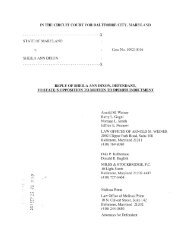Memorandum Opinion - the Circuit Court for Baltimore City
Memorandum Opinion - the Circuit Court for Baltimore City
Memorandum Opinion - the Circuit Court for Baltimore City
Create successful ePaper yourself
Turn your PDF publications into a flip-book with our unique Google optimized e-Paper software.
this proposition defendants rely on <strong>the</strong> “special injury” requirement which was until recently apart of <strong>the</strong> analysis of direct versus derivative claims contained in <strong>the</strong> Delaware decisional law.But see Tooley v. Donaldson, Lufkin & Jenrette, Inc., 845 A.2d 1031, 1035-36 (Del. 2004). Thatanalysis, even if it has any continuing support in Maryland decisions, is not persuasive herebecause <strong>the</strong> parties are unable to articulate any corporate harm occasioned by <strong>the</strong> adoption of <strong>the</strong>challenged by-law amendments. To <strong>the</strong> contrary, defendants insist that <strong>the</strong>se amendments werenecessary to protect this closed-end investment company from <strong>the</strong> kind of seizure of control andconversion to an open-end fund which plaintiffs attempted in this case. Plaintiffs do not contendthat <strong>the</strong> corporation suffered any injury. The only injury in this situation, if any, was to plaintiffShaker’s right to participate in a corporate election pursuant to by-laws consistent with law.§ 2-110. This clearly suggests that plaintiff Shaker is entitled to pursue this cause of actiondirectly.Defendants contend that directors of a Maryland corporation do not owe fiduciaryduties to stockholders and that <strong>the</strong> duties <strong>the</strong>y owe are solely to <strong>the</strong> corporation, as prescribed in§ 2-405.1, which by its terms limits en<strong>for</strong>cement to derivative actions on behalf of <strong>the</strong>corporation. In <strong>the</strong> present context of shareholder voting rights, however, this cannot be <strong>the</strong> case.Despite <strong>the</strong> lack of Maryland decisional law on this point, plaintiffs’ claim raises a fundamentalissue of corporate governance. As <strong>the</strong> Delaware Chancery <strong>Court</strong> said in Blasius:The shareholder franchise is <strong>the</strong> ideologicalunderpinning upon which <strong>the</strong> legitimacy ofdirectorial power rests ... Thus, when viewedfrom a broad, institutional perspective, it canbe seen that matters involving <strong>the</strong> integrity of<strong>the</strong> shareholder voting process involveconsiderations not present in any o<strong>the</strong>r context10
















